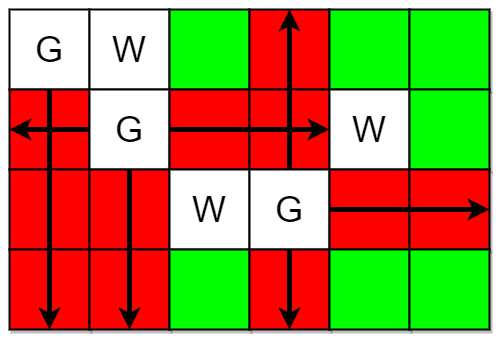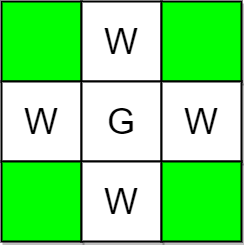Welcome to Subscribe On Youtube
Formatted question description: https://leetcode.ca/all/2257.html
2257. Count Unguarded Cells in the Grid
- Difficulty: Medium.
- Related Topics: Array, Matrix, Simulation.
- Similar Questions: Bomb Enemy, Available Captures for Rook.
Problem
You are given two integers m and n representing a 0-indexed m x n grid. You are also given two 2D integer arrays guards and walls where guards[i] = [rowi, coli] and walls[j] = [rowj, colj] represent the positions of the ith guard and jth wall respectively.
A guard can see every cell in the four cardinal directions (north, east, south, or west) starting from their position unless obstructed by a wall or another guard. A cell is guarded if there is at least one guard that can see it.
Return** the number of unoccupied cells that are not guarded.**
Example 1:

Input: m = 4, n = 6, guards = [[0,0],[1,1],[2,3]], walls = [[0,1],[2,2],[1,4]]
Output: 7
Explanation: The guarded and unguarded cells are shown in red and green respectively in the above diagram.
There are a total of 7 unguarded cells, so we return 7.
Example 2:

Input: m = 3, n = 3, guards = [[1,1]], walls = [[0,1],[1,0],[2,1],[1,2]]
Output: 4
Explanation: The unguarded cells are shown in green in the above diagram.
There are a total of 4 unguarded cells, so we return 4.
Constraints:
-
1 <= m, n <= 105 -
2 <= m * n <= 105 -
1 <= guards.length, walls.length <= 5 * 104 -
2 <= guards.length + walls.length <= m * n -
guards[i].length == walls[j].length == 2 -
0 <= rowi, rowj < m -
0 <= coli, colj < n -
All the positions in
guardsandwallsare unique.
Solution (Java, C++, Python)
-
class Solution { public int countUnguarded(int m, int n, int[][] guards, int[][] walls) { char[][] matrix = new char[m][n]; int result = 0; for (int i = 0; i <= guards.length - 1; i++) { int guardRow = guards[i][0]; int guardCol = guards[i][1]; matrix[guardRow][guardCol] = 'G'; } for (int i = 0; i <= walls.length - 1; i++) { int wallRow = walls[i][0]; int wallCol = walls[i][1]; matrix[wallRow][wallCol] = 'W'; } for (int i = 0; i <= guards.length - 1; i++) { int currentRow = guards[i][0]; int currentCol = guards[i][1] - 1; while (currentCol >= 0) { if (matrix[currentRow][currentCol] != 'W' && matrix[currentRow][currentCol] != 'G') { matrix[currentRow][currentCol] = 'R'; } else { break; } currentCol--; } currentRow = guards[i][0]; currentCol = guards[i][1] + 1; while (currentCol <= n - 1) { if (matrix[currentRow][currentCol] != 'W' && matrix[currentRow][currentCol] != 'G') { matrix[currentRow][currentCol] = 'R'; } else { break; } currentCol++; } currentRow = guards[i][0] - 1; currentCol = guards[i][1]; while (currentRow >= 0) { if (matrix[currentRow][currentCol] != 'W' && matrix[currentRow][currentCol] != 'G') { matrix[currentRow][currentCol] = 'R'; } else { break; } currentRow--; } currentRow = guards[i][0] + 1; currentCol = guards[i][1]; while (currentRow <= m - 1) { if (matrix[currentRow][currentCol] != 'W' && matrix[currentRow][currentCol] != 'G') { matrix[currentRow][currentCol] = 'R'; } else { break; } currentRow++; } } for (int i = 0; i <= m - 1; i++) { for (int j = 0; j <= n - 1; j++) { if (matrix[i][j] != 'R' && matrix[i][j] != 'G' && matrix[i][j] != 'W') { result++; } } } return result; } } ############ class Solution { public int countUnguarded(int m, int n, int[][] guards, int[][] walls) { int[][] g = new int[m][n]; for (var e : guards) { g[e[0]][e[1]] = 2; } for (var e : walls) { g[e[0]][e[1]] = 2; } int[] dirs = {-1, 0, 1, 0, -1}; for (var e : guards) { for (int k = 0; k < 4; ++k) { int x = e[0], y = e[1]; int a = dirs[k], b = dirs[k + 1]; while (x + a >= 0 && x + a < m && y + b >= 0 && y + b < n && g[x + a][y + b] < 2) { x += a; y += b; g[x][y] = 1; } } } int ans = 0; for (var row : g) { for (int v : row) { if (v == 0) { ++ans; } } } return ans; } } -
class Solution: def countUnguarded( self, m: int, n: int, guards: List[List[int]], walls: List[List[int]] ) -> int: g = [[None] * n for _ in range(m)] for r, c in guards: g[r][c] = 'g' for r, c in walls: g[r][c] = 'w' for i, j in guards: for a, b in [[0, -1], [0, 1], [1, 0], [-1, 0]]: x, y = i, j while ( 0 <= x + a < m and 0 <= y + b < n and g[x + a][y + b] != 'w' and g[x + a][y + b] != 'g' ): x, y = x + a, y + b g[x][y] = 'v' return sum(not v for row in g for v in row) ############ # 2257. Count Unguarded Cells in the Grid # https://leetcode.com/problems/count-unguarded-cells-in-the-grid class Solution: def countUnguarded(self, rows: int, cols: int, guards: List[List[int]], walls: List[List[int]]) -> int: grid = [[1] * cols for _ in range(rows)] for x, y in walls: grid[x][y] = -1 def goLeft(x, y): dy = y - 1 while dy >= 0 and grid[x][dy] != 2 and grid[x][dy] != -1: grid[x][dy] = 2 dy -= 1 def goRight(x, y): dy = y + 1 while dy < cols and grid[x][dy] != 3 and grid[x][dy] != -1: grid[x][dy] = 3 dy += 1 def goTop(x, y): dx = x - 1 while dx >= 0 and grid[dx][y] != 4 and grid[dx][y] != -1: grid[dx][y] = 4 dx -= 1 def goBottom(x, y): dx = x + 1 while dx < rows and grid[dx][y] != 5 and grid[dx][y] != -1: grid[dx][y] = 5 dx += 1 guards.sort(key = lambda x : (-x[1], x[0])) for x, y in guards: goLeft(x, y) guards.sort(key = lambda x : (x[1], x[0])) for x, y in guards: goRight(x, y) guards.sort(key = lambda x : (-x[0], x[1])) for x, y in guards: goTop(x, y) guards.sort(key = lambda x : (x[0], x[1])) for x, y in guards: goBottom(x, y) for x, y in guards: grid[x][y] = -1 res = 0 for x in range(rows): for y in range(cols): if grid[x][y] == 1: res += 1 return res -
class Solution { public: int countUnguarded(int m, int n, vector<vector<int>>& guards, vector<vector<int>>& walls) { int g[m][n]; memset(g, 0, sizeof(g)); for (auto& e : guards) { g[e[0]][e[1]] = 2; } for (auto& e : walls) { g[e[0]][e[1]] = 2; } int dirs[5] = {-1, 0, 1, 0, -1}; for (auto& e : guards) { for (int k = 0; k < 4; ++k) { int x = e[0], y = e[1]; int a = dirs[k], b = dirs[k + 1]; while (x + a >= 0 && x + a < m && y + b >= 0 && y + b < n && g[x + a][y + b] < 2) { x += a; y += b; g[x][y] = 1; } } } int ans = 0; for (auto& row : g) { ans += count(row, row + n, 0); } return ans; } }; -
func countUnguarded(m int, n int, guards [][]int, walls [][]int) (ans int) { g := make([][]int, m) for i := range g { g[i] = make([]int, n) } for _, e := range guards { g[e[0]][e[1]] = 2 } for _, e := range walls { g[e[0]][e[1]] = 2 } dirs := [5]int{-1, 0, 1, 0, -1} for _, e := range guards { for k := 0; k < 4; k++ { x, y := e[0], e[1] a, b := dirs[k], dirs[k+1] for x+a >= 0 && x+a < m && y+b >= 0 && y+b < n && g[x+a][y+b] < 2 { x, y = x+a, y+b g[x][y] = 1 } } } for _, row := range g { for _, v := range row { if v == 0 { ans++ } } } return } -
function countUnguarded(m: number, n: number, guards: number[][], walls: number[][]): number { const g: number[][] = Array.from({ length: m }, () => Array.from({ length: n }, () => 0)); for (const [i, j] of guards) { g[i][j] = 2; } for (const [i, j] of walls) { g[i][j] = 2; } const dirs: number[] = [-1, 0, 1, 0, -1]; for (const [i, j] of guards) { for (let k = 0; k < 4; ++k) { let [x, y] = [i, j]; let [a, b] = [dirs[k], dirs[k + 1]]; while (x + a >= 0 && x + a < m && y + b >= 0 && y + b < n && g[x + a][y + b] < 2) { x += a; y += b; g[x][y] = 1; } } } let ans = 0; for (const row of g) { for (const v of row) { ans += v === 0 ? 1 : 0; } } return ans; }
Explain:
nope.
Complexity:
- Time complexity : O(n).
- Space complexity : O(n).